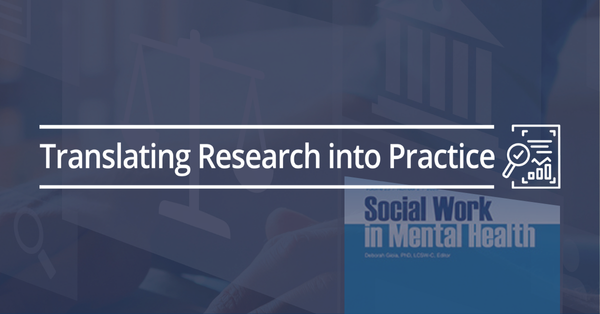Featured Article
Article Title
The emotional well-being and mental health of Hispanic immigrants in the United States: understanding the impact of traumatic experiences and coping styles
Authors
Leah M. Holle MAR, MSW, LCSW, CEDS - School of Social Work, University of Connecticut, Hartford, CT, USA
Abstract
This cross-sectional study examined factors that impact the emotional well-being of Hispanic immigrants. This study considered the experience of stigma, acculturative stress, and traumatic events on the emotional well-being of Hispanic immigrants, while exploring various coping strategies that are employed. Data from 198 Hispanic immigrants in the United States was collected from an online survey, and a multiple linear regression was used with several predictor groups. Results indicated statistical significance between traumatic experiences, acculturative stress, positive/negative religious coping, and avoidant coping styles on the emotional well-being of Hispanic immigrants. These findings hold significance for social workers and offers considerations for assessment, treatment, and advocacy.
Keywords
Hispanic immigrants; mental health; traumatic experiences; types of coping (Immigration; Clinical practice)
Summary of Research
“Immigrant populations face many challenges related to health due to cultural and language barriers, day-to-day stressors, economic and social factors, inadequate integration and social participation, and lack of access to healthcare services… The health status of immigrants in the U.S. is declining as result of decreased access to health care, lower quality health care, and less use of health care… Immigrants to the U.S. have decreased access to mental health care and experience more stressors than non-immigrants living in the U.S., which may lead to increased mental health symptoms… This study seeks to understand common traumatic experiences faced by Hispanic immigrants in the U.S., and the types of coping skills [utilized] to manage mental health symptoms…” (p. 115- 116).
“The stress Hispanic immigrants face during migration to the U.S. can impede the development of supportive family and social relationships. Once in the U.S., various factors pose risks, such as poor living conditions, job scarcity, discrimination, limited access to services and education, and the threat of deportation for undocumented arrivals… Discrimination and stigma are pervasive in Hispanic immigrants’ experiences, ingrained in societal norms and regulations… Therefore, the discrimination and stigma experienced by immigrants when integrating into society can adversely affect immigrants’ mental health outcomes…” (p. 117- 118).
“Immigration policies limiting public benefits eligibility and increasing deportations create challenges, particularly in mixed-status families. These policies disproportionately affect Hispanic immigrants... Exposure to political violence in origin countries and providers’ lack of understanding can lead to misdiagnosis and limited treatment access… Immigrants facing acculturative stress often exhibit mental health issues like depression, anxiety, post-traumatic stress disorder, and substance use disorders…
Hispanic immigrants, particularly Mexicans, endure significant acculturative stress, face unique migration challenges, [and] encounter varying levels of stress and trauma before, during, and after migration, which all exacerbate acculturative stress… Immigrants commonly endure pre-migration traumas such as abuse, war, and political unrest… Given the compounding effect of prior trauma, addressing trauma history is crucial in providing holistic mental health care to Hispanic immigrants” (p. 119-120).
“Active coping strategies, such as relying on religious beliefs, are prevalent among Hispanic immigrants and have been linked to reduced acculturative stress and improved well-being… To comprehensively examine the factors influencing the emotional well-being of Hispanic immigrants, a survey was developed to explore prevalent traumatic experiences, stressors, [and] coping mechanisms…” (p. 121).
“...Robust social support networks and strong religious connections may serve as protective factors against experiencing adverse mental health outcomes… Minority stress theory offers a comprehensive framework for understanding the macro and micro factors shaping the experiences of Hispanic immigrants with intersecting identities…” (p.123).
“Using an online survey, this study aimed to explore the relationship between emotional well-being and various factors that immigrants face, including trauma, acculturative stress, stigma, religion/spirituality, and coping mechanisms [with] a total sample size of 198 Hispanic immigrants…” (p. 123- 124).
“...Acculturative stress, the trauma of the death of a loved one, experiences of other traumatic events, positive religious coping, negative religious coping, and avoidant coping skills were all statistically significant predictors of the emotional well-being for U.S immigrants… Given the discriminatory treatment and biases in different situations of daily living such as housing, at the workplace, and access to services, having effective coping skills and supports remain crucial to mitigating acculturative stress and integrating successfully into the community” (p. 132- 134).
“...This study highlights the need for interdisciplinary care, including medical professionals, mental health supports and religious/spiritual supports in mitigating acculturative stress and providing a holistic approach to emotional well-being… This comprehensive approach facilitates a deeper understanding of the experiences of Hispanic immigrants and guides culturally responsive treatment tailored to their unique needs… There is a pressing need for mental health services to be accessible for all immigrants, irrespective of citizenship status… Understanding both positive and negative coping styles can either assist or hinder the management of these unique stressors that accompany acculturative stress, and traumatic events that Hispanic immigrants experience…” (p. 136- 137).
Translating Research into Practice
Culturally Responsive Advocacy for Immigration/ Immigrants
“Social workers are needed in advocating for more culturally responsive resources that consider potential stigmatizing language, confusing processes regarding citizenship, and offering supports that contribute to adaptive coping… When considering mental health treatment, it becomes crucial to assess [for] unexpected deaths or highly stressful experiences, including those encountered during the migration journey… Connections between Hispanic immigrants and religious centers in their host countries could offer social support and protection against acculturative stress… Social workers partnering with religious Hispanic communities [effectively] address stressors and meet the needs of immigrants…” (p. 132- 135).
“Culturally responsive care and anti-oppressive practices are essential to address structural barriers hindering immigrants’ access to equitable treatment. Social workers must support the development of adaptive coping skills that are culturally appropriate and responsive to an individual’s needs. Advocacy efforts by social workers can focus on policies promoting legal pathways to migration, authorized employment, protection from workplace discrimination and other abuses, and broader access to public health benefits…
Holistic and Collaborative Assessments
Assessments conducted by medical providers, social workers, and religious leaders should encompass various aspects, including traumatic events [as well as] coping strategies… Enhancing the availability of bilingual providers and integrating evidence-informed practices that address migration-related stressors is essential in meeting these needs. Moreover, training initiatives aimed at frontline social workers interacting with Hispanic immigrants can improve their competency in assessing social and cultural resources, coping strategies, and facilitating connections to religious resources” (p. 136- 137).
Other Interesting Tidbits for Researchers and Clinicians
Clinical Practice Role in Mental Health Stigma
“The inclusion of medical professionals is particularly salient as most Hispanic immigrants are likely to receive medical outpatient care for more symptoms related to illness and pain (which are often a somatization of mental health distress) than present for outpatient mental health care…
Given the stigma of receiving treatment for mental health conditions, a shift in language to referring to it as “emotional well-being” may be needed to decrease stigma and increase engagement in mental health care…
A culturally responsive lens is needed to understand coping patterns, and to support in understanding how to best support Hispanic immigrants with integrating into society while adaptively navigating daily stressors, like acculturative stress and mental health symptoms” (p. 136- 137).
Expanding Trauma Research for Immigrants
“Further research should focus on more longitudinal studies to more closely understand factors that impact both physical health and emotional well-being. Physical health should be further assessed and explored in relation to Hispanic immigrants. Additionally, further research should compare differences in coping styles across more diverse ethno-racial backgrounds, differing origin countries, level of acculturation and experiences of trauma… Trauma should be expanded to include measuring experiences between pre/during/post migration to better understand the compounded effect of migration, acculturative stress, and stigma with previous experiences of trauma” (p.138).
Additional Resources/Programs
As always, please join the discussion below if you have thoughts or comments to add!




























